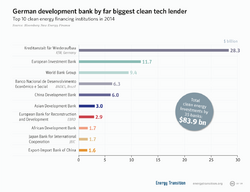Finance:Development finance institution

A development finance institution (DFI) also known as a development bank or development finance company (DFC) is a financial institution that provides risk capital for economic development projects on non commercial basis. They are often established and owned by governments or charitable institutions to provide funds for projects that would otherwise not be able to get funds from commercial lenders. Some development banks include socially responsible investing and impact investing criteria into their mandates. Governments often use development banks to form part of their development aid or economic development initiatives.
DFIs can include multilateral development banks, national development banks, bilateral development banks, microfinance institutions, community development financial institution and revolving loan funds.[1] These institutions provide a crucial role in providing credit in the form of higher risk loans, equity positions and risk guarantee instruments to private sector investments in developing countries.[2] DFIs are typically backed by countries with developed economies.
As of 2005[update], total commitments (as loans, equity, guarantees and debt securities) of the major regional, multilateral and bilateral DFIs totalled US$45 billion (US$21.3 billion of which went to support the private sector).[2] DFIs often provide finance to the private sector for investments that promote development and to help companies to invest, especially in countries with various restrictions on the market.[2]
Development banks include:
- Community development banks which fund low-income areas in the United States
- International financial institutions conducting development-oriented finance on a bilateral or multilateral basis
- National development banks are government-owned financial institution that provides financing for economic development.
- Multilateral development bank are development banks set up by a group of countries and often operate under international laws.
References
- ↑ Andrea Levere, Bill Schweke, and Beadsie Woo, Development Finance and Regional Economic Development, Washington, DC: CFED, July 2006
- ↑ 2.0 2.1 2.2 Dirk Willem te Velde and Michael Warner (2007) Use of subsidies by Development Finance Institutions in the infrastructure sector Overseas Development Institute
